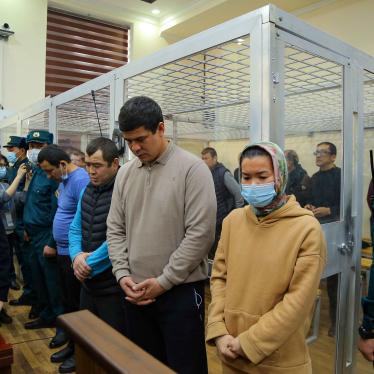There are many officials of good will in the Bush Administration who do want, as Secretary of State Condoleezza Rice told congressional hearings last week, to create a new U.N. Human Rights Council (HRC) which would be a substantial improvement on the existing Commission on Human Rights. However, it is hard to see how that objective has been furthered by the stance taken by the United States in the negotiations in New York.
As its solution to the problem of improving the membership of the new body and preventing the election of inappropriate countries, the U.S. has clung single-mindedly to a proposal to bar the election to the HRC of countries currently under sanctions imposed by the U.N. Security Council for human-rights related reasons. As Secretary Rice acknowledged, this proposal has proven highly unpopular. Many U.N. member states were reluctant to give the already very powerful Security Council new power to bar countries from serving on the HRC, and observed that the five permanent members of the Security Council (the “P-5”) would never be under sanctions and thus barred. This concern was exacerbated by U.S. Ambassador John Bolton’s proposal, to presume the P-5 will always be entitled to serve on the Council. As this proposal would award permanent seats to China and Russia, however poor their human rights records might be or one day become, it only made the U.S. look hypocritical.
Throughout the negotiations, the U.S. has refused to support a requirement that regional groups of states nominate more countries than the number of seats allocated to their regions, a measure which would establish open and competitive elections, and has only half-heartedly endorsed the Secretary-General’s proposal to require a two-thirds supermajority for election to the HRC as a tool to prevent the election of countries with poor human rights records. In the final negotiations last week, the U.S. has returned to pressing only for its pet proposal to exclude countries under sanctions, harming the prospects for the supermajority proposal.
The U.S. proposal is as ineffectual as it is unpopular. It would not apply to rights violators such as China, Cuba, Iran, Zimbabwe, Libya, Saudi Arabia, Burma, Uzbekistan, or many others. Of the seven situations where sanctions now apply, only two were imposed against national governments on human rights-related grounds, and only two countries – Sudan and Cote d’Ivoire – would thus be barred from the HRC. The supermajority proposal could have accomplished this much and more.
The President of the General Assembly, Jan Eliasson of Sweden, is expected this week to release a proposed final text of a resolution establishing the HRC. The product of difficult compromises, it will likely contain some but not all of the elements that would make the new body much stronger and more effective. Human Rights Watch and other nongovernmental organizations will work if possible to improve the text, but we will surely use our privilege to participate in the new body if established, as we have always done at the existing Commission, however flawed. Win or lose on resolutions, by its very intergovernmental nature, the Commission and the HRC provide a premier political forum to confront human rights violators and draw attention to abuses.
There are some in the United States who would walk away from the U.N. human rights machinery if the unpopular and ineffectual proposal to exclude countries under sanctions is not included in the resolution. Much of the debate over the Commission in the U.S. has misunderstood the inherent limitations of a body of governments, most of which have some human rights problems, and many other economic and political objectives around the world apart from human rights, judging the human rights records of other governments. However, a system of objective inputs – from “special rapporteurs” and other procedures, and from nongovernmental organizations – has developed under the Commission and will continue under the HRC. The new body will for the first time have standards and procedures to discourage the election of less appropriate members, and will provide ongoing review of the human rights records of all countries, in longer sessions spaced throughout the year.
There is a battle to be waged to get the new body off to a good start, elect the best possible initial members, establish strong rules and procedures, and develop the universal review mechanisms. The United States should join in that battle, and work to make the new body function substantially better than the old. Surely the inability to win its ineffectual pet proposal is no reason for the U.S. to take its marbles and walk away from the fight to improve human rights protection within the U.N. system.





